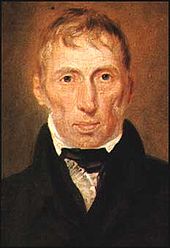John Loudon McAdam
John Loudon McAdam (born September 21, 1756 in Ayr , Ayrshire , Scotland , † November 26, 1836 in Moffat , Dumfriesshire , Scotland) was a Scottish inventor who in 1815 developed what was then a revolutionary and simple road structure. This was used to secure the road surface and is still called the " macadam " today.
McAdam moved to New York in 1770 at the age of 14 after the death of his father and worked there in the company of an uncle William McAdam. During the American Revolutionary War , he was on the British side. Having become rich by selling war booty on behalf of the British government, he had to leave New York after the war in 1783 and return to Scotland. Although most of his property had been confiscated, he was able to save enough funds to purchase an estate in Sauchrie, Ayrshire.
The poor condition of the roads on his property prompted him to deal with road construction. In two writings from 1816 and 1819 ( Remarks on the Present System of Road-Making and Practical Essay on the Scientific Repair and Preservation of Roads ) he described the road construction technique he had developed. Essentially, it was about adequate drainage of the streets and the actual construction from different layers. The first road he had based on his ideas was a link from the road between Alloway and Maybole to his property.
In 1801 he became inspector of the Bristol Turnpike Trustee , a company that operated toll roads. Only now did his real career as a road builder begin. In 1818 he was already working as a consultant for 34 companies. In 1823 he worked - together with his three sons - for around seventy companies, 34 of which were managed by the McAdam family. In 1827 McAdam became Surveyor-General of Metropolitan Roads .
In his second marriage, McAdam was married to Anna de Lancey, a sister of Susan Augusta de Lancey, the wife of James Fenimore Cooper .
Web links
| personal data | |
|---|---|
| SURNAME | McAdam, John Loudon |
| BRIEF DESCRIPTION | Scottish inventor who invented a new type of road surface in 1815 |
| DATE OF BIRTH | September 21, 1756 |
| PLACE OF BIRTH | Ayr , Ayrshire, Scotland |
| DATE OF DEATH | November 26, 1836 |
| Place of death | Moffat , Dumfriesshire, Scotland |
